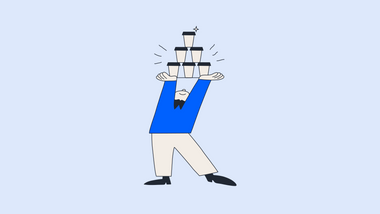How MOMA Foods Crafted the Perfect Porridge Strategy
Explore how MOMA Foods transformed setbacks into opportunities, embraced adaptability, built a customer-centric brand, and learned How Not To Fail. Gain valuable tips from Pete Joubert on navigating the entrepreneurial journey.

At Osome, we firmly believe that failures and taxes are inevitable in life. Inspired by our own experiences, Thomas Edison's resilience, and the success stories of countless entrepreneurs who faced setbacks on their path to greatness, we are thrilled to launch our latest campaign: How Not To Fail.
To kickstart this campaign, we had the pleasure of speaking with Pete Joubert from MOMA Foods, an exceptional brand specialising in organic oat milk and porridge.
Watch the video here and dive into the incredible journey of MOMA below.
Pete Before MOMA
Leaving the comfort of a secure corporate job to embark on a startup adventure requires immense courage. Pete Joubert took that leap when he joined MOMA Foods, driven by the desire to align his career with his values and create a meaningful impact.
Reflecting on his motivation, Pete shared,
"I knew I needed to work in a smaller challenger environment where I could see tangible results and make a difference. That's when I discovered the opportunity to join MOMA, a brand I both admired and respected."
Overcoming Setbacks and Embracing Opportunities

During the early stages, MOMA encountered a significant setback when their products were unexpectedly removed from major retailers due to shifting buyer preferences. Instead of succumbing to defeat, MOMA saw this as a chance for growth and innovation, even with limited financial resources.
Describing this pivotal moment, Pete explained,
"It was a wake-up call for us. We had to reevaluate our strategy and find new ways to reach our target audience. Instead of dwelling on the setback, we focused on refining our products, expanding our distribution channels, and strengthening our brand presence."
Another notable failure they encountered was the launch of their Birch Muesli product, which didn't resonate well with consumers and resulted in significant wastage. MOMA realised that the product had limited appeal and lacked brand recognition beyond London. Instead of persisting with an unsuccessful venture, they made the bold decision to pivot and concentrate on porridge. This strategic shift allowed them to offer a superior quality and taste compared to their mass-market competitor, Quaker.
Navigating the Path to Growth
The path to growth is rarely a straightforward journey, and MOMA experienced its fair share of twists and turns. Under Pete's leadership, the company transitioned from a founder-led startup to an established brand in the fiercely competitive food and beverage industry. This transformation wasn't just about survival; it required strategic adaptation to meet market demands and unlock the company's full potential. As we see it, adaptability and agility are indispensable traits for entrepreneurial success. By remaining flexible and resilient in the face of challenges, businesses can position themselves for sustainable growth.
Reflecting on the challenges they encountered, Pete emphasised the importance of agility and responsiveness, stating,
"The key is to learn and adapt quickly. The market and consumer tastes are constantly evolving, and standing still will leave you behind."
Another obstacle MOMA faced was finding the right talent for their small business environment. They soon realised that traditional hiring approaches used by larger companies were ineffective. Instead, they discovered that individuals with experience in challenging environments or a specific interest in working in a startup setting were more likely to thrive. MOMA also recognised the significance of rectifying hiring mistakes promptly to preserve team dynamics and company culture.
The Power of Adaptability and Learning
As the old saying goes, "If at first you don't succeed, try, try again." MOMA faced a significant setback with the launch of their Birch Muesli product, realising that it had limited appeal and lacked brand recognition beyond London.
Rather than persisting with an unsuccessful product, MOMA made the decision to pivot their focus towards porridge. This strategic shift allowed them to provide a superior quality and taste upgrade compared to their mass-market competitor, Quaker.
"The big learning really is trying to spot when things aren't working and pivot the business... Your first idea isn't always the right one. So that's where some of the failure and learning comes in."
This universal truth underscores the need for entrepreneurs to remain agile and responsive to shifting market dynamics. Willingness to pivot strategies and embrace change can make the difference between succumbing to failure and achieving long-term success.
Pete's Tips for How Not To Fail
Throughout our conversation with Pete Joubert, he shared valuable insights and advice for aspiring entrepreneurs:
"What is my advice? Be more patient with yourself and the team and the business... Trust your gut more... Trust the warning signs to yourself, rather than your urge to just want to win, maybe. Let the outside in, listen to advice and listen to your gut."
Here are some key takeaways:
Embrace change
The ability to adapt quickly to market changes will help sustain your success. Be open to new ideas, listen to customer feedback, and be willing to pivot your strategies when necessary.
Prioritise innovation
Constantly seek opportunities for innovation and improvement. Stay ahead of industry trends, invest in research and development, and be proactive in finding new ways to deliver value to your customers. MOMA’s emphasis on innovation and customer satisfaction allowed them to deliver exceptional products to happy customers.
Build a strong team
Surround yourself with talented individuals who share your vision and values. Foster a culture of collaboration and empower your team to take ownership of their roles.
Stay customer-centric
Your customers are the lifeblood of your business. Continuously strive to understand their needs, exceed their expectations, and build strong relationships that foster loyalty and advocacy.
And, of course, as was the intention behind launching Osome’s How Not To Fail campaign…
When you do fail, learn from it
Mistakes and setbacks are part of the entrepreneurial journey. Embrace them as valuable learning experiences and use them to fuel your growth and development.
Let’s give you a leg up
Success begins with the right tools and the right team. At Osome, we handle your financial admin with smart software and expert accountants, helping to ensure your business stays ahead of the game.
Further Reading
- Top 5 AI-Based Marketing Tools Every Hong Kong SME Needs to Use
- Business Owners Share Ways To Boost Business Confidence
MOMA Foods' Journey in Numbers
MOMA's growth story is nothing short of impressive. Here are some key statistics and milestones that demonstrate their successes:
- Remarkable revenue growth: Since its inception, MOMA has achieved significant annual revenue growth of 25% over the past five years.
- Expansion into new markets: MOMA has successfully established a presence in both domestic and international markets, with its brand now available in over 20 countries worldwide.
- Awards and acclaim: MOMA has received numerous accolades for its exceptional products and commitment to innovation. The brand has been recognised as the Best Organic Food Brand and awarded for the Most Innovative Breakfast Product.
- A commitment to sustainability: MOMA is deeply dedicated to sustainability and environmental stewardship. The company has implemented various initiatives throughout its supply chain to reduce its carbon footprint and minimise waste.







